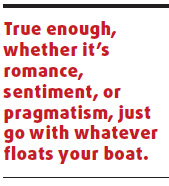Comment
Romantic French, sentimental Chinese, earnest Americans
By Qi Zhai (China Daily)
Updated: 2009-12-01 10:15
|
 |
When discussing cultural differences in love, a friend (who has ample experience) once summed it up nicely: "The French are romantic while the Chinese are sentimental."
I can't think of a better way to put it. When I was 16, studying in France for the summer, I fell in love with my 19-year-old French neighbor. Actually I fell in "like", but his sweeping romantic gestures and dramatic language - tossing "amour, amour" around all the time - whirled me up in my first French "love" affair.
His English was patchy and my French was only slightly better, but I could comprehend that the flowery lines of poetry he scribbled and the phrases he breathed while looking into my eyes intensely and managing to keep a straight face were things that would be simplycheesy in any other language.
Alas, I was young and excited by the romantic novelty, so I overlooked the little things. Like how he never offered to buy my movie ticket all summer long, nor did he bother to call or write after I left. My first French love affair ended quite abruptly after an over-the-top goodbye scene, complete with rustic country house, overgrown garden, and my lover's promises that for a "longtemps" he would see me "walking through his dreams".

When I got older, I found myself losing interest in this kind of romantic flair and craving the subtle sentiment of the Chinese. A "good Chinese man" is not one for words. Until this decade, he shuddered at words like "dear", "honey" and "love", finding them bourgeois and vapidly unrealistic. But a Chinese man will work on the little things. He will work hard.
My college Chinese boyfriend once saw me fill a glass of water to keep on the night stand before going to bed and remorsefully told me, "I'm sorry, it should be my job to take care of these things."
He meant that as his girl, I shouldn't have to look after my own comfort, especially not on a small thing like hydration. My Chinese boyfriend was never good at making romantic promises, but each time he took me to the airport he would put a thick envelop in my hand as we said goodbye. On the plane, I would open it up to find funny stories he had written to keep me entertained on board.
For years, my Chinese boyfriend nurtured our love with his countless small tenderness, like biking out on a cold day to buy a hot water bottle that kept me warm when I studied in the cold library.
This contrast between French romance and Chinese sentiment makes me wonder - what then is the American approach to love? I can best describe it as a straightforward kind of pragmatism.
Look at it with cynical eyes and you might feel that American girls have it worst. Chivalry is "out" after the feminist movement, but true equality is not yet "in". Flowery romance is not "macho" enough for the American man and sentiment is simply not practical.
My American boyfriend asked me, "Why should I get you a glass of water? Why don't you get it yourself?"
But there are plenty of good things about this "no BS" kind of love that is in between romance and sentiment.
An American man won't pledge to dream of you walking through a field of poppies every night, nor is he eager to jump on fetching your water for as long as you are alive, but he will stick by your side and try in earnest to make you happy in his straightforward way.
I've seen plenty of passionate French unions dissolve with the simple shrug of a shoulder and an "I fell in love with someone else" by way of explanation (Nicolas and Cecilia Sarkozy, to take a famous example).
Just as many tender loving Chinese boyfriends turn into philandering middle-aged husbands who have an unspoken free pass to "socialize" because it has become some kind of socio-economic developmental norm to do so.
Although the lead in to an American commitment and marriage can be a long awkward dance - "Is it too early to take him home for Thanksgiving?" or "When is he going to pop the question?" - once committed, the American man takes loyalty seriously (American politicians excepted).
So what of all this philosophizing about love? In the end, it's different strokes for different folks and to each his own. When I was living my global love experiment before finding my favorite cultural-romantic mutt (the husband), my good friend often advised me, "Just do what makes you happy."
True enough, whether it's romance, sentiment, or pragmatism, just go with whatever floats your boat. Live, love, and be happy!









